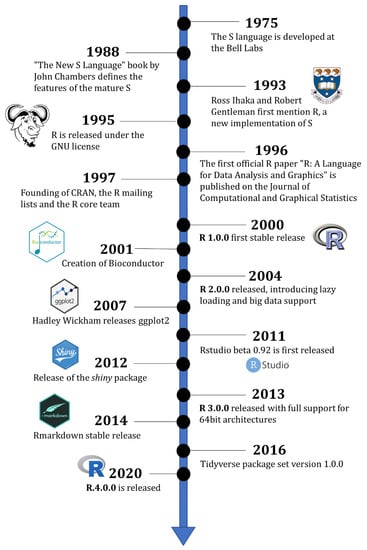Some Ideas on Bioinformatics Tutor You Need To Know
Some Ideas on Bioinformatics Tutor You Need To Know
Blog Article
Bioinformatics Tutor - Questions
Table of ContentsWhat Does Bioinformatics Tutor Mean?The Definitive Guide for Bioinformatics TutorThe Best Guide To Bioinformatics TutorAn Unbiased View of Bioinformatics TutorBioinformatics Tutor Fundamentals Explained
Of the total participants included in the training, 80% were trainees from public college institutions, while the continuing to be 20% came from exclusive establishments. To receive a certificate of participation, pupils were needed to go to at the very least 90% of the total training hours. As an outcome of this need, a remarkable 95% of the participants successfully obtained their certificates, having not only fulfilled the minimum attendance criteria but additionally completed all designated tasks throughout the training.
During the elevation of the COVID-19 pandemic, especially between June and August 2020, the job group was tasked with arranging specialized training in bioinformatics. This training was particularly targeted at pupils from the research study group Core for Research in Applied Computer at the Federal College of Pará (UFRA) The adaptation to remote understanding systems due to the pandemic created a possibility to discover new training approaches and digital tools that improved both reach and efficiency.
This program was designed to give an easily accessible yet thorough introduction of Artificial Intelligence strategies, especially as used in bioinformatics (Bioinformatics Tutor). This online layout allowed engagement from trainees throughout Brazil, numerous of whom could not have had the chance to participate in in-person sessions.
Everything about Bioinformatics Tutor
Around 50% of the complete training hours were committed to sensible tasks where pupils constructed smart versions and applications in an array of clinical domain names, consisting of genes, molecular biology, and ecological data analysis. These platforms enabled students to engage in real-time information adjustment, version training, and formula trial and error.
Sixty of them were associated with various greater education institutions in the state of Pará, while the continuing to be twenty came from organizations located in 5 other Brazilian states. By presenting Artificial Intelligence in a sensible and appropriate context, the initiative offered to connect the void between concept and real-world application, offering pupils with a solid structure for future research study or work in the field.
The training initiative developed part of a wider scholastic outreach effort called the Bioinformatics when traveling task. This project has, for many years, introduced loads of trainees to the globe of bioinformatics and computational biology. The events held under this umbrella campaign have occurred across several areas and years, as summarized in Table 1 (Checklist of occasions, locations, years, and overall varieties of trainees and trainers)
Among one of the most exceptional results of the Bioinformatics when driving effort has actually been its payment to the development of decentralized research teams. Numerous of these groups, at first combined by their involvement in training events, have actually considering that gone on to create independent clinical anonymous study in partnership with neighborhood scholastic establishments. The training not just promoted scientific thinking within the context of bioinformatics but also triggered joint relationships that extended beyond the training atmosphere. These partnerships have actually brought about raised regional clinical efficiency and contributed meaningfully to the development of the broader bioinformatics community in Brazil.
Little Known Facts About Bioinformatics Tutor.
The very same team, omitting IH and RR, additionally acted as tutors for the useful training components. Funding for the job was offered via the grant 88887.200562/ 2018-00 from CAPES.
The Federal College of Pará's Office of Study (PROPESP/UFPA) also offered economic support, especially for the production of the final manuscript. The writers declare no economic or industrial problems of interest that might have affected the research. Moreover, all analyses and opinions revealed in this write-up are solely those of the writers and do not necessarily reflect those of their particular institutions, the author, editors, or customers entailed in the publication procedure.

All About Bioinformatics Tutor
From an instructional viewpoint, the training technique utilized in the training was deliberately interactive. Classes were carried out in a manner that urged pupil involvement and discussion, surpassing memorizing memorization to discover exactly how ideas are created, used in every day life, and checked in scholastic settings. The instructional ideology concentrated on supporting both solid and battling pupils, supplying customized assistance, and structure confidence through continual mentorship and perseverance.

Each group, containing around 36 individuals, was supported by 3 mentors-- most of whom were postdoctoral researchers with specific know-how. These mentors not just aided design the team jobs yet also promoted their implementation, ensuring that each research inquiry was both properly challenging and pertinent. The goal was to provide a naturally sensible context that individuals might explore why not try these out via open-ended objectives and accessibility to curated datasets.
For additional insights right into the methodology and end results of this project-based discovering strategy, viewers are guided to S1 Text, which consists of comprehensive descriptions of the pedagogical framework, evaluation approaches, and job motifs utilized in the useful link training sessions.
A Biased View of Bioinformatics Tutor
Of the total amount individuals entailed in the training, 80% were trainees from public greater education institutions, while the staying 20% came from exclusive establishments. To qualify for a certificate of involvement, trainees were needed to attend at the very least 90% of the complete training hours. Notably, beyond the students who enlisted in the training sessions, 7 experienced instructors took part in providing the programs, while 3 specialized study teachers worked with the total training procedure. About 50% of the complete training hours were committed to sensible tasks where pupils developed smart designs and applications in a variety of scientific domains, including genes, molecular biology, and ecological information evaluation. The training not just fostered clinical reasoning within the context of bioinformatics yet additionally triggered collective connections that prolonged beyond the training environment.
Report this page